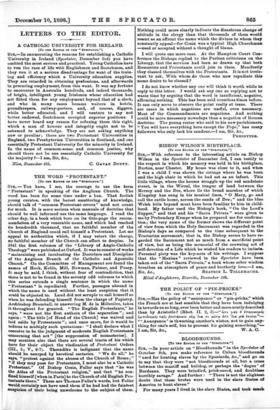THE WORD "PROTESTANT." [To THE EDITOR 01 THE "SPECTATOR:1 You
have, I see, the courage to use the term ." Protestant" in speaking of the Anglican Church. The word has been for some time under a ban. That foolish young curates, with the barest smattering of knowledge, should talk of "common Protestant errors" need not count for much. It is more serious when manuals of doctrine that should be well informed use the same language. I read the other day, in a book which bore on its title-page the recom- mendation of a very venerable name, and which had reached its hundredth thousand, that no faithful member of the Church of England could call himself a Protestant. Let me appeal to authorities which, if I may retort the charge, no faithful member of the Church can affect to despise. In 1841 the first volumes of the "Library of Anglo-Catholic Theology " were published at Oxford. It was to consist of works "maintaining and inculcating the Doctrines and Discipline of the Anglican Branch of the Catholic and Apostolic Church." On the Committee of Management are found the names of Hook, Keble, Mill, Newman, Palmer, and Pusey. It may be said, I think, without fear of contradiction, that there is not to be found in the seventy odd volumes to which this series extends a single sentence in which the name "Protestant" is repudiated. Further, passages abound in which the name is used without the least suspicion that it would be objected to. Land did not scruple to call himself so when he was defending himself from the charge of Papistry. Archbishop Bramhall, in answering M. de la Milletiere, takes it throughout for granted. " The English Protestants," he says, were not the first authors of the separation "; and again : " The title [of Head of the Church] was waived and laid aside by Protestants "; and once more, for it would be tedious to multiply such quotations : " I shall declare what I conceive to be the judgment of moderate English Protestants concerning that act" [the suppression of monasteries]. I may mention also that there are several tracts of his which have for their object the vindication of Protestant Orders 5; V., 6.7). Thorndike is indignant that the name should be usurped by heretical sectaries. " We do all," he says, "protest against the abuses of the Church of Rome ; " 4' if they may pass for Protestants, I must also be a Catholic Protestant." Of Bishop Cosin, Faller says that "he was the Atlas of the Protestant religion," and that " he con- fined himself [when in Paris] to the Church of old English Pro- testants there." These are Thomas Faller's words, but Fuller would certainly not have used them if he had had the faintest suspicion of their being unwelcome to the subject of them.
Nothing could more clearly indicate the disastrous change of attitude in the clergy than that thousands of them would resent as an affront the name which the divines to whom they constantly appeal—for Cosin was a typical High Churchman —need or accepted without a thought of blame.
I will quote one more case. At the Hampton Court Con- ference the Bishops replied to the Puritan criticisms on the Liturgy, that the services had been so drawn np that both Romanists and Protestants could join in them. Manifestly they classed themselves with the Protestants. It is not irrele- vant to ask, With whom do those who now repudiate this name desire to be classed P I do not know whether any one will think it worth while to reply to this letter. I would ask any one so replying not to waste time by arguing that the word is insufficient, negative, affirming nothing. This has been said countless times before. It can only serve to obscure the point really at issue. There are cases in which negations are useful, even necessary. Most of the Commandments are negations. And nothing could be more necessary nowadays than a negation of Roman doctrine. The young rector who said to his new parishioners, " You will have everything here except the Pope," has many followers who only lack his candour.—I am, Sir, &c., PRESBYTER.










































 Previous page
Previous page